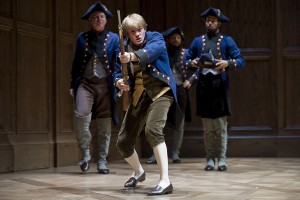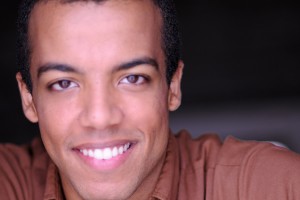Theater
Last call for ‘Candide’
Gay actor Stone among high points of production
‘Candide’
Directed and adapted from Voltaire by Mary Zimmerman
Through Sunday
Harman Hall
610 F Street, N.W.
202-547-1122
One weekend remains to see Shakespeare Theatre Company’s production of “Candide” — it closes Sunday.
The 1956 masterpiece has several gay angles — late composer Leonard Bernstein, contributions from a young Stephen Sondheim and actor/singer/dancer Joey Stone, who came out in high school and who (among various roles) plays an elegant Senor and a raping-and-pillaging soldier in this newest version of Voltaire’s dark satiric novella of 1759. Stone is also dance captain in the show birthed last fall at Chicago’s Goodman Theatre and then transported wonderfully intact to D.C.’s Shakespeare Theatre Harman Hall.
The story itself is familiar, boy meets girl, but then they are sadly parted. Actually, however, in this case, “boy grows up with girl.” Handsome-but-penniless young Candide, who is illegitimate, lives on the estate of his uncle the baron, with his cousin Cunegunde, the baron’s self-absorbed-but-delightfully pretty daughter. They reside in Westphalia, one of those tiny German principalities of the time, where they are taught by the indulgent Dr. Pangloss, to believe that “all is for the best in this best of all possible worlds.”
But dark clouds of war threaten and anyway Candide himself is soon dispatched by the baron into exile. From then on, nothing is for the best any longer, as not only war but also earthquake and religious inquisition intervene, and both Candide and Cunegunde travel, mostly separately, through ordeal after ordeal, until their foolish Panglossian optimism is knocked right out of them along with their naive stuffing.
Along their way, both Candide and Cunegunde keep meeting, in various guises, the dark-haired and bearded Stone, who in one of his roles, rapes Cunegunde. In fact, much of the time Stone’s character is party to the “awful price” paid by the young couple during their many ordeals, including in one of the funniest songs, “What a Day for an Auto-da-fe” — literally, execution in the guise of purification to save the deceased’s soul — where Stone lurks darkly among the gang of religious zealots cheering on the capital punishment.
Louisville native Stone began life, he says, with his father in the military, “not too much as a brat, but definitely as an army kid.” While attending the Youth Performing Arts School (a public magnet school in Louisville), “I came out to my friends first,” he recalls now, when he was sure he was then “the only out gay dude in high school.” But he only came out much later to his mother.
He left school at the University of Cincinnati College Conservatory of Music (CCM) after his junior year in 2007 and moved to Chicago “to think outside the box,” he says, no longer satisfied with conventional conservatory study for the performing arts. Almost immediately he began to get parts, at first in “The Rocky Horror Show” — hired, says Stone, “basically the first day I go there.” Other parts soon followed, including as puppeteer and back-up singer in “The Snow Queen” and several other puppet shows.

Geoff Packard in the title role in 'Candide.' Co-star Joey Stone holds his hat in the background. (Photo courtesy of Shakespeare Theatre Company)
Living in Chicago, Stone moved on to parts in “Funny Girl,” “Cabaret,” “Mame” and “Sweet Charity,” but continues to dabble in music also, forming his own band, Barack and the Obamas.
“We are hilarious,” he says. “We pay homage to the ’60s girl-groups like Diana Ross and the Supremes.”
He also worked as assistant choreographer for several shows at the House, Chicago’s “environmental theater” performance space. Meanwhile, Mary Zimmerman, winner of a 1998 MacArthur “genius grant” and a 2002 Tony award for Best Director, was busy reinventing Voltaire’s and Bernstein’s “Candide.” Stone auditioned for the cast and was picked and the show, he says, “is exactly what I have dreamed of doing.”
“I sleep with the narrator,” he says, “and I rape Cunegunde,” though he insists that it’s all done “very elegantly, choreographed into a dance, but it certainly is rape.”
As the show’s dance captain, he also has his hands and feet full. He says “the show is not so much dance as it is orchestrated movement, sometimes very much ballroom dance.”
One of his friends in the cast is Lauren Molina, with her superlative soprano who delights as Cunegunde, the ingenue who suffers many stumbles en route to the final resolution when she and Candide vow to cultivate their gardens and give up their naivete about life. But first she must pass through harems and other liaisons as a kept woman, and one of the highlights of the show is her song of self-satisfaction mixed with self-disgust, “Glitter and be Gay.” She confesses she delights in her diamond bracelets, but unlike Mae West is far less fond of what she calls “the awful price” she must pay in bed for those glittering luxuries.
Molina joined recently in Chicago with Stone to produce a music video cover of “Fuck You,” the 2010 hit pop song by hip-hop singer Cee-Lo Green — sometimes edited for radio as “F.U.” or “Forget You,” and performed that way on “Glee.” Their unvarnished version is now a hit on YouTube. Molina also has her own CD, “Sea for Two,” for sale in the Harman Hall lobby. It includes her catchy single, “Gonna Be Alright,” a duet featuring Jeremy Jordan, her former Broadway cast-mate from “Rock of Ages.” The music video for this infectiously fun tune shows them duking it out in a New York apartment.
Geoff Packard, the gorgeous tenor voice for Candide, was also a student at CCM where he admits “I was the only straight guy in my class.”
He graduated in 2003 and just missed Stone who arrived there the next year. Packard, 29 but looking closer to 19, grew up in Brockport, N.Y., near Rochester, and in high school did little with the performing arts, instead playing three sports and a band instrument, though he dabbled in school productions. Packard went on to co-star with Molina in the 1980s-style metal-rock Broadway musical “Rock of Ages” and also has his own CD out – “Fairytales and Fortunes.”
Theater
Out actor Kevin Cahoon on starring role in ‘Chez Joey’
Arena production adapted from Broadway classic ‘Pal Joey’

‘Chez Joey’
Through March 15
Arena Stage
1101 Sixth St., S.W.
Tickets start at $93
Arenastage.org
As Melvin Snyder in the new musical “Chez Joey,” out actor Kevin Cahoon plays a showbiz society columnist who goes by the name Mrs. Knickerbocker. He functions as a sort of liaison between café society and Chicago’s Black jazz scene circa 1940s. It’s a fun part replete with varied insights, music, and dance.
“Chez Joey” is adapted from the Broadway classic “Pal Joey” by Richard Rodgers and Lorenz Hart. It’s inspired by John O’Hara’s stories based on the exploits of a small-time nightclub singer published in The New Yorker.
A warm and humorous man, Cahoon loves his work. At just six, he began his career as a rodeo clown in Houston. He won the Star Search teen division at 13 singing songs like “Some People” from “Gypsy.” He studied theater at New York University and soon after graduating set to work playing sidekicks and comedic roles.
Over the years, Cahoon has played numerous queer parts in stage productions including “Hedwig and the Angry Inch,” “La Cage aux Folles,” “Rocky Horror” as well as Peanut in “Shucked,” and George the keyboardist in “The Wedding Singer,” “a sort of unicorn of its time,” says Cahoon.
Co-directed by Tony Goldwyn and the great Savion Glover, “Chez Joey” is a terrific and fun show filled with loads of talent. Its relevant new book is by Richard Lagravenese.
On a recent Monday off from work, Cahoon shared some thoughts on past and current happenings.
WASHINGTON BLADE: Is there a through line from Kevin, the six-year-old rodeo clown, to who we see now at Arena Stage?
KEVIN CAHOON: Anytime I want to land a joke in a theater piece it goes back to that rodeo clown. It doesn’t matter if it’s Arena’s intimate Kreeger Theatre or the big rodeo at the huge Houston Astrodome.
I was in the middle stadium and there was an announcer — a scene partner really. And we were doing a back and forth in hopes of getting laughs. At that young age I was trying to understand what it takes to get laughs. It’s all about timing. Every line.
BLADE: Originally, your part in “Chez Joey” Melvin was Melba who sings “Zip,” a clever woman reporter’s song. It was sort of a star feature, where they could just pop in a star in the run of “Pal Joey.”
CAHOON: That’s right. And in former versions it was played by Martha Plimpton and before her Elaine Stritch. For “Chez Joey,” we switched gender and storyline.
We attempted to do “Zip” up until two days before we had an audience at Arena. Unexpectedly they cut “Zip” and replaced it with a fun number called “I Like to Recognize the Tune,” a song more connected to the story.
BLADE: Wow. You must be a quick study.
CAHOON: Well, we’re working with a great band.
BLADE: You’ve played a lot of queer parts. Any thoughts on queer representation?
CAHOON: Oh yes, definitely. And I’ve been very lucky that I’ve had the chance to portray these characters and introduce them to the rest of the world. I feel honored.
After originating Edna, the hyena on Broadway in “The Lion King,” I left that to do “Hedwig and the Angry Inch” as standby for John Cameron Mitchell, doing one show a week for him.
Everyone thought I was crazy to leave the biggest musical of our time with a personal contract and getting paid more money that I’d ever made to get $400 a week at the downtown Jane Street Theatre in a dicey neighborhood.
At the time, I really felt like I was with cool kids. I guess I was. And I never regretted it.
BLADE: When you play new parts, do you create new backstories for the role?
CAHOON: Every single time! For Melvin, I suggested a line about chorus boys on Lakeshore Drive.
BLADE: What’s up next for Kevin Cahoon?
CAHOON: I’m about to do the New York Theatre Workshop Gala; I’ve been doing it for nine years in a row. It’s a huge job. I’ll also be producing the “Cats: The Jellicle Ball” opening on Broadway this spring; it’s a queer-centric uptown vogue ball with gay actor André de Shields reprising his role as “Old Deuteronomy.”
BLADE: There’s a huge amount of talent onstage in “Chez Joey.”
CAHOON: There is. I’m sharing a dressing room with Myles Frost who plays Joey. He won accolades for playing Michael Jackson on Broadway. We’ve become great friends. He’s a miracle to watch on stage. And Awa [Sal Secka], a D.C. local, is great. Every night the audience falls head over heels for her. When this show goes to New York, Awa will, no doubt, be a giant star.
BLADE: Do you think “Chez Joey” might be Broadway bound?
CAHOON: I have a good feeling it is. I’ve done shows out of town that have high hopes and pedigree, but don’t necessarily make it. “Chez Joey” is a small production, it’s funny, and audiences seem to love it.
Theater
José Zayas brings ‘The House of Bernarda Alba’ to GALA Hispanic Theatre
Gay Spanish playwright Federico García Lorca wrote masterpiece before 1936 execution

‘The House of Bernarda Alba’
Through March 1
GALA Hispanic Theatre
3333 14th St., N.W.
$27-$52
Galatheatre.org
In Federico García Lorca’s “The House of Bernarda Alba,” now at GALA Hispanic Theatre in Columbia Heights, an impossibly oppressive domestic situation serves, in short, as an allegory for the repressive, patriarchal, and fascist atmosphere of 1930s Spain
The gay playwright completed his final and arguably best work in 1936, just months before he was executed by a right-wing firing squad. “Bernarda Alba” is set in the same year, sometime during a hot summer in rural Andalusia, the heart of “España profunda” (the deep Spain), where traditions are deeply rooted and mores seldom challenged.
At Bernarda’s house, the atmosphere, already stifling, is about to get worse.
On the day of her second husband’s funeral, Bernarda Alba (superbly played by Luz Nicolás), a sixtyish woman accustomed to calling the shots, gathers her five unmarried daughters (ages ranging from 20 to 39) and matter-of-factly explain what’s to happen next.
She says, “Through the eight years of mourning not a breeze shall enter this house. Consider the doors and windows as sealed with bricks. That’s how it was in my father’s house and my grandfather’s. Meanwhile, you can embroider your trousseaux.”
It’s not an altogether sunny plan. While Angustias (María del Mar Rodríguez), Bernarda’s daughter from her first marriage and heiress to a fortune, is betrothed to a much younger catch, Pepe el Romano, who never appears on stage, the remaining four stand little chance of finding suitable matches. Not only are they dowry-less, but no men, eligible or otherwise, are admitted into their mother’s house.
Lorca is a literary hero known for his mastery of both lyrical poetry and visceral drama; still, “Bernarda Alba’s” plotline might suit a telenovela. Despotic mother heads a house of adult daughters. Said daughters are churning with passions and jealousies. When sneaky Martirio (Giselle Gonzáles) steals the photo of Angustias’s fiancé all heck kicks off. Lots of infighting and high drama ensue. There’s even a batty grandmother (Alicia Kaplan) in the wings for bleak comic relief.
At GALA, the modern classic is lovingly staged by José Zayas. The New York-based out director has assembled a committed cast and creative team who’ve manifested an extraordinarily timely 90-minute production performed in Spanish with English subtitles easily ready seen on multiple screens.
In Lorca’s stage directions, he describes the set as an inner room in Bernarda’s house; it’s bright white with thick walls. At GALA, scenic designer Grisele Gonzáles continues the one-color theme with bright red walls and floor and closed doors. There are no props.
In the airless room, women sit on straight back chairs sewing. They think of men, still. Two are fixated on their oldest siter’s hunky betrothed. Only Magdelena (Anna Malavé), the one sister who truly mourns their dead father, has given up on marriage entirely.
The severity of the place is alleviated by men’s distant voices, Koki Lortkipanidze’s original music, movement (stir crazy sisters scratching walls), and even a precisely executed beatdown choreographed by Lorraine Ressegger-Slone.
In a short yet telling scene, Bernarda’s youngest daughter Adela (María Coral) proves she will serve as the rebellion to Bernarda’s dictatorship. Reluctant to mourn, Adela admires her reflection. She has traded her black togs for a seafoam green party dress. It’s a dreamily lit moment (compliments of lighting designer Hailey Laroe.)
But there’s no mistaking who’s in charge. Dressed in unflattering widow weeds, her face locked in a disapproving sneer, Bernarda rules with an iron fist; and despite ramrod posture, she uses a cane (though mostly as a weapon during one of her frequent rages.)
Bernarda’s countenance softens only when sharing a bit of gossip with Poncia, her longtime servant convincingly played by Evelyn Rosario Vega.
Nicolás has appeared in “Bernarda Alba” before, first as daughter Martirio in Madrid, and recently as the mother in an English language production at Carnegie Melon University in Pittsburgh. And now in D.C. where her Bernarda is dictatorial, prone to violence, and scarily pro-patriarchy.
Words and phrases echo throughout Lorca’s play, all likely to signal a tightening oppression: “mourning,” “my house,” “honor,” and finally “silence.”
As a queer artist sympathetic to left wing causes, Lorca knew of what he wrote. He understood the provinces, the dangers of tyranny, and the dimming of democracy. Early in Spain’s Civil War, Lorca was dragged to the the woods and murdered by Franco’s thugs. Presumably buried in a mass grave, his remains have never been found.
Theater
Magic is happening for Round House’s out stage manager
Carrie Edick talks long hours, intricacies of ‘Nothing Up My Sleeve’

‘Nothing Up My Sleeve’
Through March 15
Round House Theatre
4545 East-West Highway
Bethesda, Md. 20814
Tickets start at $50
Roundhousetheatre.org
Magic is happening for out stage manager Carrie Edick.
Working on Round House Theatre’s production of “Nothing Up My Sleeve,” Edick quickly learned the ways of magicians, their tricks, and all about the code of honor among those who are privy to their secrets.
The trick-filled, one-man show starring master illusionist Dendy and staged by celebrated director Aaron Posner, is part exciting magic act and part deeply personal journey. The new work promises “captivating storytelling, audience interaction, jaw-dropping tricks, and mind-bending surprises.”
Early in rehearsals, there was talk of signing a non-disclosure agreement (NDA) for production assistants. It didn’t happen, and it wasn’t necessary, explains Edick, 26. “By not having an NDA, Dendy shows a lot of trust in us, and that makes me want to keep the secrets even more.
“Magic is Dendy’s livelihood. He’s sharing a lot and trusting a lot; in return we do the best we can to support him and a large part of that includes keeping his secrets.”
As a production assistant (think assistant stage manager), Edick strives to make things move as smoothly as possible. While she acknowledges perfection is impossible and theater is about storytelling, her pursuit of exactness involves countless checklists and triple checks, again and again. Six day weeks and long hours are common. Stage managers are the first to arrive and last to leave.
This season has been a lot about learning, adds Edick. With “The Inheritance” at Round House (a 22-week long contract), she learned how to do a show in rep which meant changing from Part One to Part Two very quickly; “In Clay” at Signature Theatre introduced her to pottery; and now with “Nothing Up My Sleeve,” she’s undergoing a crash course in magic.
She compares her career to a never-ending education: “Stage managers possess a broad skillset and that makes us that much more malleable and ready to attack the next project. With some productions it hurts my heart a little bit to let it go, but usually I’m ready for something new.”
For Edick, theater is community. (Growing up in Maryland, she was a shy kid whose parents signed her up for theater classes.) Now that community is the DMV theater scene and she considers Round House her artistic home. It’s where she works in different capacities, and it’s the venue in which she and actor/playwright Olivia Luzquinos chose to be married in 2024.
Edick came out in middle school around the time of her bat mitzvah. It’s also around the same time she began stage managing. Throughout high school she was the resident stage manager for student productions, and also successfully participated in county and statewide stage management competitions which led to a scholarship at the University of Maryland, Baltimore County (UMBC) where she focused on technical theater studies.
Edick has always been clear about what she wants. At an early age she mapped out a theater trajectory. Her first professional gig was “Tuesdays with Morrie” at Theatre J in 2021. She’s worked consistently ever since.
Stage managing pays the bills but her resume also includes directing and intimacy choreography (a creative and technical process for creating physical and emotional intimacy on stage). She names Pulitzer Prize winning lesbian playwright Paula Vogel among her favorite artists, and places intimacy choreographing Vogel’s “How I learned to Drive” high on the artistic bucket list.
“To me that play is heightened art that has to do with a lot of triggering content that can be made very beautiful while being built to make you feel uncomfortable; it’s what I love about theater.”
For now, “Nothing Up My Sleeve” keeps Edick more than busy: “For one magic trick, we have to set up 100 needles.”
Ultimately, she says “For stage managers, the show should stay the same each night. What changes are audiences and the energy they bring.”





















